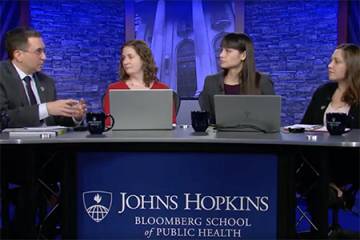Johns Hopkins is evaluating the placements of its study abroad students around the world and is reconfiguring the operations of School of Advanced International Studies campuses in China and Italy in light of the ongoing coronavirus outbreak.
Seven undergraduate students who are participating in study abroad programs in Italy have returned or are making plans to immediately return to the U.S., university officials said Monday. The decision to suspend the Italian programs came after the country received a level three designation from the Centers for Disease Control and Prevention and the U.S. State Department on Friday, which indicates that the public should avoid non-essential travel there. More than 2,500 cases of coronavirus have been confirmed in Italy, and areas with the highest community transmission of coronavirus—Lombardy, which includes Milan, and Veneto, which includes Venice—have been designated as level four, indicating that the public should avoid all travel there.
South Korea, where more than 5,500 cases of coronavirus have been confirmed, also has a level three designation. One Johns Hopkins undergrad canceled study abroad plans in South Korea this semester before traveling there.
The university requires all study abroad programs in a country to be suspended when travel warnings reach level three. Other countries affected by the university's current study abroad restrictions include China and Iran, and the university also advises students to postpone travel to locations with CDC travel warning levels one and two, including Japan and Hong Kong. The Office of Study Abroad, which is coordinating study abroad programming for 74 students in 20 programs this spring, is closely monitoring guidance from institutions including the CDC, the U.S. State Department, the World Health Organization, and Johns Hopkins' own COVID-19 tracker map to stay up-to-date on the evolving outbreak, according to OSA Director Lori Citti.
"We've been monitoring the outbreak since early January, along with a variety of other safety and security issues we monitor as part of our standard emergency management protocols," Citti says. "Our study abroad programs are important and immersive experiences, so when we cancel or suspend a program, those decisions are not made lightly and are informed by the advice and recommendations of experts."
The Office of Study Abroad will partner with academic advising for the Krieger School of Arts and Sciences and the Whiting School of Engineering to work with returning students to facilitate the completion of their study abroad coursework remotely and to transfer credits toward their undergraduate degrees.
Two overseas campuses of the Johns Hopkins School of Advanced International Studies have adapted their operations to move online, allowing students to continue their studies remotely. SAIS Europe—located in Bologna, Italy, which is not one of the areas of the country with level four warnings—is in the process of moving all courses online. Graduate students enrolled in programs at SAIS Europe, including those in the BA/MA dual degree programs, have the option to remain in Italy, although courses will be broadcast online to accommodate students who choose to leave. Students will receive daily email updates as SAIS Europe works to move coursework online.
The Hopkins-Nanjing Center, which is run jointly by Johns Hopkins SAIS and Nanjing University, moved courses entirely online at the start of the spring semester in February. The campus is located about 330 miles from Wuhan City in Hubei province, the epicenter of the initial coronavirus outbreak and where most cases have been concentrated.
Posted in University News, Student Life
Tagged study abroad, coronavirus










